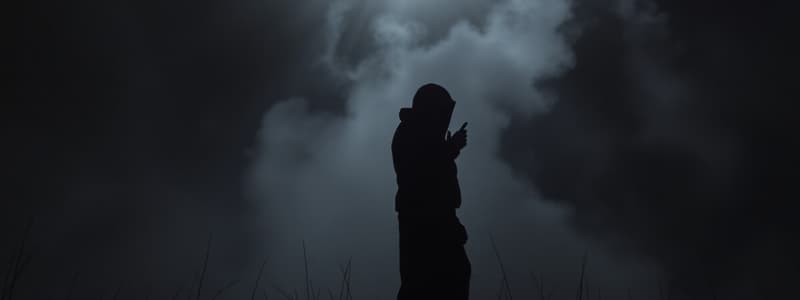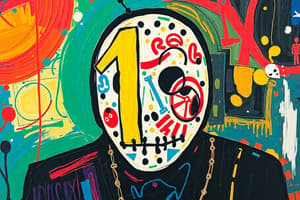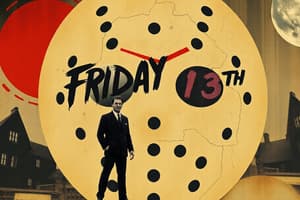Podcast
Questions and Answers
Which of the following best describes the mission of the '13 Club'?
Which of the following best describes the mission of the '13 Club'?
- To celebrate the goddess Frigg and her association with Friday.
- To provide a space to discuss Nordic mythology and numerology.
- To promote the idea that Friday the 13th is an unlucky day.
- To actively challenge and disprove common superstitions. (correct)
According to numerology, why is the number 13 considered to be 'out of place'?
According to numerology, why is the number 13 considered to be 'out of place'?
- It is associated with the demonization of the goddess Frigg.
- It is linked to an ancient Nordic myth about misfortune.
- It disrupts the sense of completion that the number 12 represents. (correct)
- It was the amount of members in the '13 Club' that aimed to disprove superstitions.
What role did the Christian Church play in the formation of the Friday's negative connotations?
What role did the Christian Church play in the formation of the Friday's negative connotations?
- They attempted to demonize the goddess Frigg, which may have contributed to Friday's unlucky image. (correct)
- They actively encouraged weddings to take place on Fridays.
- They sought to align the name of Friday with positive concepts related to blessings.
- They supported Frigg as the deity of love, beauty, wisdom, war, death, and magic, which led to Friday's celebration.
Which of the following statements is true regarding the origins of Friday the 13th superstition?
Which of the following statements is true regarding the origins of Friday the 13th superstition?
Who was Donald Dossi, and what was his point of view on Friday the 13th?
Who was Donald Dossi, and what was his point of view on Friday the 13th?
Flashcards
Friday the 13th Superstition
Friday the 13th Superstition
The belief that Friday the 13th brings bad luck.
The 13 Club
The 13 Club
A group of 133 men who aimed to disprove the superstition of Friday the 13th.
The Number 13 in Mythology
The Number 13 in Mythology
The number 13 holds negative connotations in Nordic mythology because it represents a disruption of completeness.
Friday's Negative Association
Friday's Negative Association
Signup and view all the flashcards
Friday the 13th: Unlucky Combination
Friday the 13th: Unlucky Combination
Signup and view all the flashcards
Study Notes
Friday the 13th Superstition
- The superstition of Friday the 13th being unlucky first appeared in the mid-19th century.
- The "13 Club," founded in 1881 by US Army Captain William Fowler, consisted of 133 men who aimed to disprove superstitions.
- The club's inaugural meeting was on Friday the 13th.
- Activities associated with the club included walking under ladders and breaking mirrors.
- Donald Dossi, a folklore historian, suggests the origins of the Friday the 13th superstition stem from ancient history.
The Number 13 & Misfortune
- The number 13 has negative connotations in Nordic mythology.
- In numerology, 12 represents completeness, making 13 an "odd" or "out of place" number.
Friday's Unluckiness
- Friday's name is derived from the Norse goddess Frigg (also known as Freya), the goddess of love, beauty, wisdom, war, death, and magic.
- Friday was considered an unlucky day for weddings.
- The Christian Church attempted to demonize Frigg, which may contribute to Friday's negative association.
- The combination of the number 13's negative connotations and Friday's association with Frigg led to people associating Friday the 13th with bad luck.
Studying That Suits You
Use AI to generate personalized quizzes and flashcards to suit your learning preferences.





